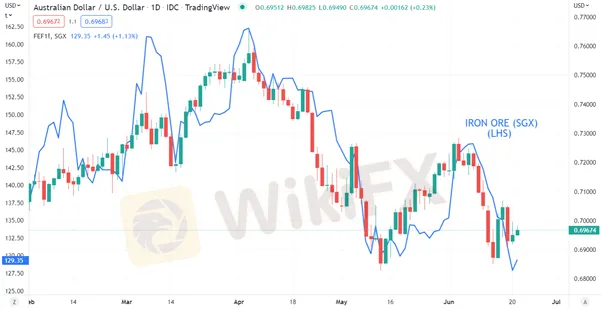简体中文
繁體中文
English
Pусский
日本語
ภาษาไทย
Tiếng Việt
Bahasa Indonesia
Español
हिन्दी
Filippiiniläinen
Français
Deutsch
Português
Türkçe
한국어
العربية
Australian Dollar Bounces on Hawkish RBA
Abstract:AUSTRALIAN DOLLAR, AUD/USD, RBA, YCC, IRON ORE, CHINA- TALKING POINTS
Click Here: After you read it, Daily Routine with WikiFX
The Australian Dollar hasn't changed since the RBA spent the morning talking to the public.
The RBA's media department has had a busy day. Their review of their yield curve control (YCC) program was published, Governor Lowe gave a speech, and the minutes from the June meeting of the monetary policy committee were made public.

Dr. Lowe was giving a speech in Sydney at an event put on by the American Chamber of Commerce. He basically went over the main points of the YCC review again and said the same things he said last week.
Most importantly, the RBA thinks that inflation will reach 7% in the December quarter and that the cash rate could reach 2.5% later this year.
The RBA famously gave up on the YCC program in November 2021, when underlying conditions and the market forces they caused simply made it useless.
The RBA knows that YCC had problems and that when the bank left the program, it hurt its reputation. Most notable was the volatility in the markets when fundamentally it no longer made sense to aim for a certain yield in a certain bond.
The bank said that the fact that it had said an exit from YCC would happen in 2024 was a big problem. When the policy was put into place, it was thought that the economy would grow at a slower rate and at a lower level than it did.
When it comes to inflation, Dr. Lowe pointed out three things that the bank thinks will bring inflation back to their target of 2% to 3% next year:
Pandemic supply problems will be fixed over time.
Technically speaking, inflation is the rate at which prices change, not the level of prices. For inflation to stay high, prices need to keep going up. (This is what the Fed called a “base effect”)
Tightening the world's monetary policy.
All of these are possible options, but they could also cause problems. At the very least, the demand side of inflation is the only thing a central bank can control. The RBA has made it clear that policy is getting tighter so that this can happen.
This week, the Australian Dollar is also being hurt by other things. The price of iron ore has dropped, as have the prices of many other industrial metals. Iron ore futures on both the Singapore Exchange (SGX) and the Dalian Commodity Exchange (DCE) are down about 20% from their April highs.
This is because people are worried about China's zero-case Covid-19 policy, which is hurting the world's second-largest economy.
Even though Beijing is trying to help with policy, sudden lockdowns keep the Chinese real estate market in a state of uncertainty.
Disclaimer:
The views in this article only represent the author's personal views, and do not constitute investment advice on this platform. This platform does not guarantee the accuracy, completeness and timeliness of the information in the article, and will not be liable for any loss caused by the use of or reliance on the information in the article.
Read more

INFINOX Partners with Acelerador Racing for Porsche Cup Brazil 2025
INFINOX has teamed up with Acelerador Racing, sponsoring an Acelerador Racing car in the Porsche Cup Brazil 2025. This partnership shows INFINOX’s strong support for motorsports, adding to its current sponsorship of the BWT Alpine F1 Team.

The Daily Habits of a Profitable Trader
Every professional trader follows a structured approach to ensure they are well-prepared, disciplined, and able to seize opportunities with confidence. Whether you are a seasoned investor or an aspiring trader, adhering to a robust daily checklist can significantly enhance your performance. Use this checklist to check if you are a qualified trader

The Impact of Interest Rate Decisions on the Forex Market
Interest rate changes determine currency attractiveness, influencing capital flows and exchange rate trends. Understanding this mechanism helps investors navigate the forex market effectively.

How a Housewife Lost RM288,235 in a Facebook Investment Scam
A 47-year-old housewife in Malaysia recently fell victim to an online investment scam, losing a substantial sum of RM288,235 after engaging with a fraudulent scheme advertised on Facebook.
WikiFX Broker
Latest News
TradingView Brings Live Market Charts to Telegram Users with New Mini App
Trump tariffs: How will India navigate a world on the brink of a trade war?
Interactive Brokers Launches Forecast Contracts in Canada for Market Predictions
Authorities Alert: MAS Impersonation Scam Hits Singapore
Stocks fall again as Trump tariff jitters continue
INFINOX Partners with Acelerador Racing for Porsche Cup Brazil 2025
Regulatory Failures Lead to $150,000 Fine for Thurston Springer
April Forex Trends: EUR/USD, GBP/USD, USD/JPY, AUD/USD, USD/CAD Insights
March Oil Production Declines: How Is the Market Reacting?
Georgia Man Charged in Danbury Kidnapping and Crypto Extortion Plot
Currency Calculator







